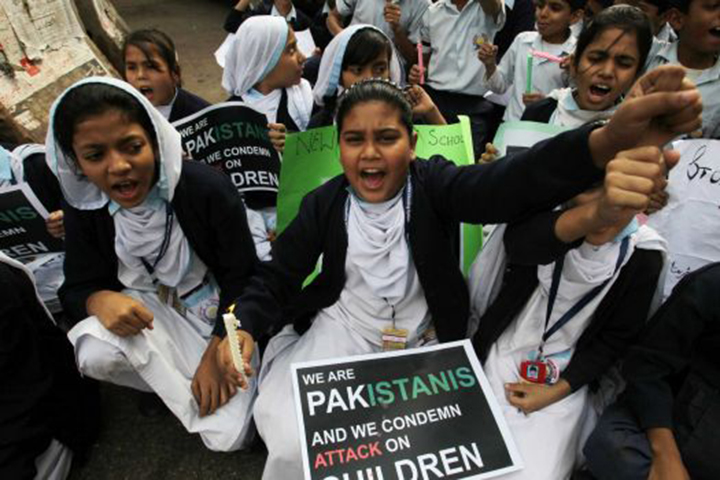
Pakinstani Army officials report today that a retaliation against Taliban forces on the border of Afganistan was successful following a school attack earlier this week by the terrorist group.
The Army air and ground attacks are reported to have killed 77 Taliban militants, including a group of 32 active fighters. The ambush happened in the Khyber tribal region's Tirah Valley where Pakistan has conducted several military operations last June.
The attack was in retaliation for a massacre that happened on Tuesday involving 148 people, 130 of which were children at a military school in Peshwar. When the Taliban claimed responsibility for the massacre, stating that it was the group's own revenge for an earlier attack on Taliban children, the Pakistani people called for the government to step in and fight back. This attack was in repsonse to that outcry, as was Pakistan's reinstatement of the death penalty on Wednesday.
But the perception of the Taliban forces in Pakistan is mixed as some believe that there are "bad Taliban" and "good Taliban." Bad Taliban are the ones seen as responsible for the school massacre, doing so to fight what they see as Pakistan's growing relationship with the West. But the good Taliban are seen as members of a group that is sympathetic to Pakistan's interests in taking control over Afghanistan, including those who are strongly anti-Indian.
When the Pakistani people wanted revenge brought only to the bad Taliban, Pakistan's Prime Minister Nawaz Sharif made a clarification, stating that "there is no difference between good Taliban and bad Taliban," and military actions in the area will work toward cleaning up "this region of terrorism."
As the L.A. Times reports, these perceived good Taliban have been working as Pakistan's security of sorts, and the real problem comes as the country continues to affiliate itself with militant Islamic groups who are increasingly secular and splintered.
Case in point comes on Thursday when the country's anti-terrorism court paid the bail to release Zaki-ur-Rehman Lakhvi, the suspected mastermind of the 2008 terrorist attacks in Mumbai, India.
"There's reason to be skeptical of Sharif's statements because he's not the man in charge," said Raza Rumi, a Pakistan expert and senior fellow at the U.S. Institute of Peace in Washington.
The Christian Science Monitor's Taha Siddiqui wrote this week about the Taliban attack and how it may soon be forgotten to focus efforts against the United States.
"Yet even after one of the most horrific slaughters of the innocent in Pakistani history, it is questionable whether the public is ready to entirely abandon its support of militancy - or a deeply populist view that the basic cause of the attacks stem from US and Western interference.
"The Pakistani Taliban, which quickly claimed responsibility for the attack, have long presented themselves as sympathetic and devout fighters subject to US drone attacks and unscrupulous Pakistani officials.
"Several analysts say the incident will likely soon be forgotten, noting popular influences in the media that include conservative Islamists arguing that the real issue is Pakistan's alliance with the West in what they depict as a fight against Islam."














